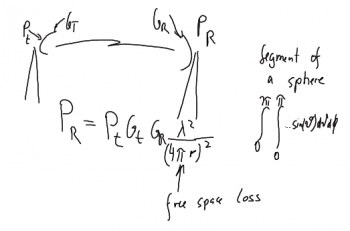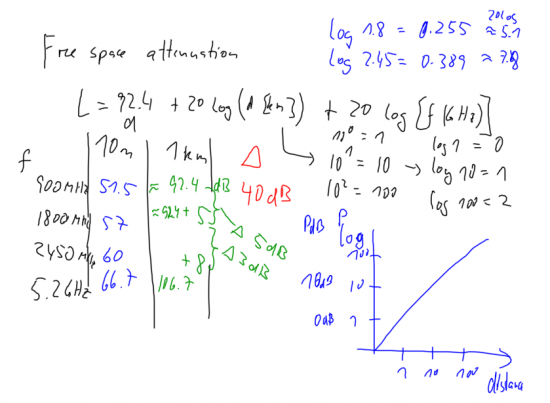Difference between revisions of "B1-Free Space Propagation"
From its-wiki.no
Josef.Noll (Talk | contribs) |
Josef.Noll (Talk | contribs) |
||
| Line 20: | Line 20: | ||
Calculation of free space attenuation. Note the increased free-space attenuation of approx 5 dB from 900 to 1800 Unik/MHz, and a further increase of 3 dB from 1800 (GSM 1800) to 2450 Unik/MHz (802.11b). Note also that increasing the distance by a factor of 10 will increase the power requirements by 20 dB. | Calculation of free space attenuation. Note the increased free-space attenuation of approx 5 dB from 900 to 1800 Unik/MHz, and a further increase of 3 dB from 1800 (GSM 1800) to 2450 Unik/MHz (802.11b). Note also that increasing the distance by a factor of 10 will increase the power requirements by 20 dB. | ||
| + | |||
| + | |||
| + | =⌘ Further readings = | ||
| + | * see [[Wave Propagation Parameters]] (by Joachim Tingvold) | ||
Revision as of 21:07, 20 September 2014
| Wiki for ITS | ||||||
|---|---|---|---|---|---|---|
|
⌘ Free space propagation
develop propagation equation, see (http://www.antenna-theory.com/basics/friis.php)
- convert into dB
- provide examples for f = 10 MHz, 1 GHz, 100 GHz
- discuss influences on radiation pattern
Free space attenuation
⌘Comments

|
Free space propagation from a transmit (t) to a receive (r) station. |
Calculation of free space attenuation. Note the increased free-space attenuation of approx 5 dB from 900 to 1800 Unik/MHz, and a further increase of 3 dB from 1800 (GSM 1800) to 2450 Unik/MHz (802.11b). Note also that increasing the distance by a factor of 10 will increase the power requirements by 20 dB.
⌘ Further readings
- see Wave Propagation Parameters (by Joachim Tingvold)
